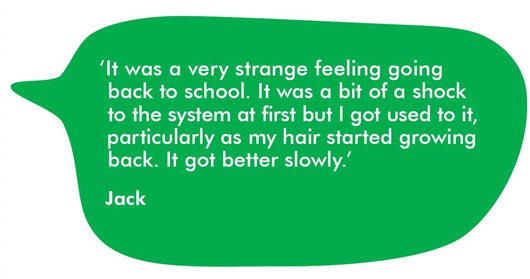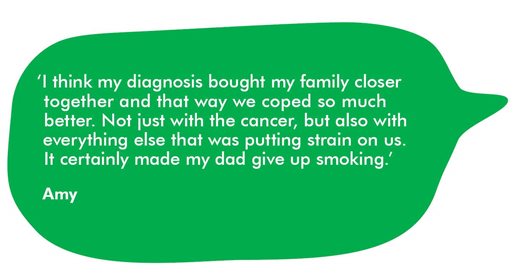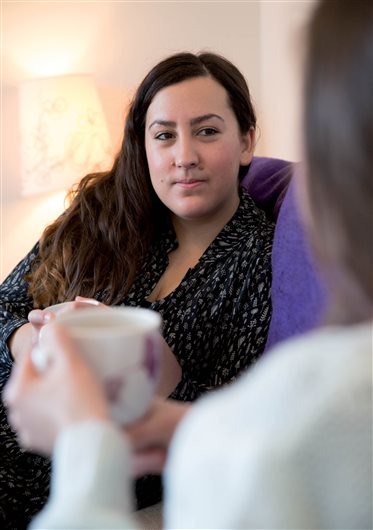After International Youth Day at the weekend (12th August), we are thinking about young people affected by cancer. Editorial assistant Liza has some top tips for dealing with your feelings and sorting out the practical things if you are a young person living with cancer.
Finding out you have cancer can be a huge shock for anyone, but it can be especially tough when you’re young. You’ll probably experience lots of different emotions, and they’re all perfectly natural responses.
No matter what you’re feeling, you don’t have to deal with everything on your own. We have some tips for dealing with your emotions and for sorting out practical matters, which you might find helpful. You can order our booklet The cancer guide for young people for more information.
Your feelings
Sometimes it might be tempting to withdraw and keep quiet about your feelings, but trying to be open and honest with people can help.
Top tip: Talk to someone. Staying in touch with friends can help you feel more confident. If you don’t want to open up to someone close to you, you could talk to professionals in hospital, or call our support line on 0808 808 00 00. There are also groups on the Macmillan Online Community which you might find helpful, such as the 16-24 year olds living with cancer group.
Top tip: Express your feelings. You could write, blog, play music, draw, or paint. Even if you don’t normally do these things, they can be a good way to let out your feelings.
School, university or work
You may be able to continue school, university or work while you are having treatment. If not, you might go back once treatment is over and you’re feeling well again. It’s normal to worry about mixing with people your own age again, or to feel different to people around you.

Top tip: It’s a good idea to try to meet up with your friends at home, or somewhere you feel comfortable, before you go back to school or work. It could give you more confidence.
Top tip: You or your parent(s) could let your teachers or employer know about any effects that treatment has had, or any new needs you may have.
You might find it helpful to read a booklet by the charity Children’s Cancer and Leukaemia Group (CCLG) called I have finished my treatment…what happens next?
Family and friends
When someone in the family has cancer, it can put a big strain on everyone. As a young person, you may already be breaking away from your family a bit, which could lead to some communication problems. Finding out you have cancer can make communicating even trickier. People react in different ways when you tell them you have cancer. We have information about talking about cancer with your friends and family, which you may find helpful.
Top tip: Try to be aware of the affect the cancer may have on the people around you. Your friends and family are also under pressure. They may be worried, overprotective, or frightened. It helps if your parent(s) get clear information from your nurses and doctors. It’s a good idea if you can all talk it through together.
Top tip: Parents, family, and friends will want to help – but they might not get it right all the time. Give them some help, and try to talk calmly and clearly about what you want, and how you feel.

Top tip: It might be easier to talk about important things while you’re doing something else – for example while you are driving to hospital, or cooking a meal. Sometimes, when the focus isn’t directly on you, it can be a lot easier to say what you feel.

Going to hospital
If you’ve never been to hospital before you may be nervous. But you might be surprised by what you find. Just because you are there for care and treatment, doesn’t mean you will always be in bed. Some hospitals have a day room, or young people’s units with computers, internet, and music.
We have some tips from young people who’ve been through the experience:
Top tip: Make your space your own. You might have a room or a curtained cubicle, but you can bring posters, photos and cuddy toys – whatever makes the space work for you.
Top tip: Close the curtains around your bed whenever you like. It’s okay to want to be alone sometimes.
Top tip: Bring some entertainment – a smart phone, magazines, books, hand-held games, or even a DVD player and films. You could ask friends and family for things to borrow, and swap with people if you run out.
Top tip: Unless you are having tests or need to stay in bed, you can wear your everyday clothes. Bring comfortable things that make you feel good.
Top tip: If your friends seem nervous about visiting you in hospital you might want to take the lead and invite them. Don’t worry if things feel a bit awkward to begin with – you will soon get used to being with each other again. Of course, you can also stay in touch by social media and messaging.
Even though you’re being treated for cancer, you’re still the same person you were before. It’s just that the illness might have made you reconsider what’s important in your life. Sometimes this can make it feel hard to fit in with your own age group. Many people find that joining a cancer support group can help you connect with people who have had similar experiences. There are bound to be times when you feel down, so don’t forget that most young people who’ve had cancer go on to return to good health and achieve the things in life they want.
To see what else Macmillan's cancer information team has been blogging about, please visit our blog home page! You can subscribe to receive our blogs by email or RSS too.
We're with you every step of the way
The Macmillan team is here to help. Our cancer support specialists can answer your questions, offer support, or simply listen if you need a chat. Call us free on 0808 808 00 00.
Comments? Feel free to add them below (you need to be logged in).
Keep in touch Follow Macmillan’s cancer information team on Twitter @mac_cancerinfo
Whatever cancer throws your way, we’re right there with you.
We’re here to provide physical, financial and emotional support.
© Macmillan Cancer Support 2024 © Macmillan Cancer Support, registered charity in England and Wales (261017), Scotland (SC039907) and the Isle of Man (604). Also operating in Northern Ireland. A company limited by guarantee, registered in England and Wales company number 2400969. Isle of Man company number 4694F. Registered office: 89 Albert Embankment, London SE1 7UQ. VAT no: 668265007